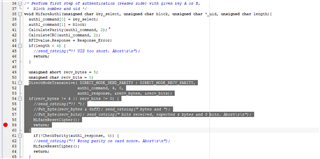Other Parts Discussed in Thread: , TRF7960A, MSP430F6777, MSP430F6777A, TRF7960
Hi Experts,
Our custmer have been using your MSP430F6726 and TRF7960A products in their project for a long time. Recently, they have replaced MSP430F6726 with MSP430F6726A because the MSP430F6726 product is not available.
So they have started to implement the same project and the same code with MSP430F6726A and TRF7960A. It has worked fine.
Now, it has been told that the MSP430F6726A product is not on the market now. So they get another product which is MSP430F6777.
They are trying to implement the same project and the same code with MSP430F6777. But it is not working with TRF7960A properly. They have been working on it for one month. But MSP430F6777 and TRF7960A are not working properly with the same code that they have used for MSP430F6777 and MSP430F6777A.
They have realized that there is no difference between MSP430F6777 and MSP430F6726 other than size, shape, and pin-port order.
Is there any remarkable difference between 6726 and 6777? I have also checked their online comparison: Compare products (ti.com) but was still not sure what went wrong. We hope to receive your advise. Thank you so much.
Best regards,
Gerald



